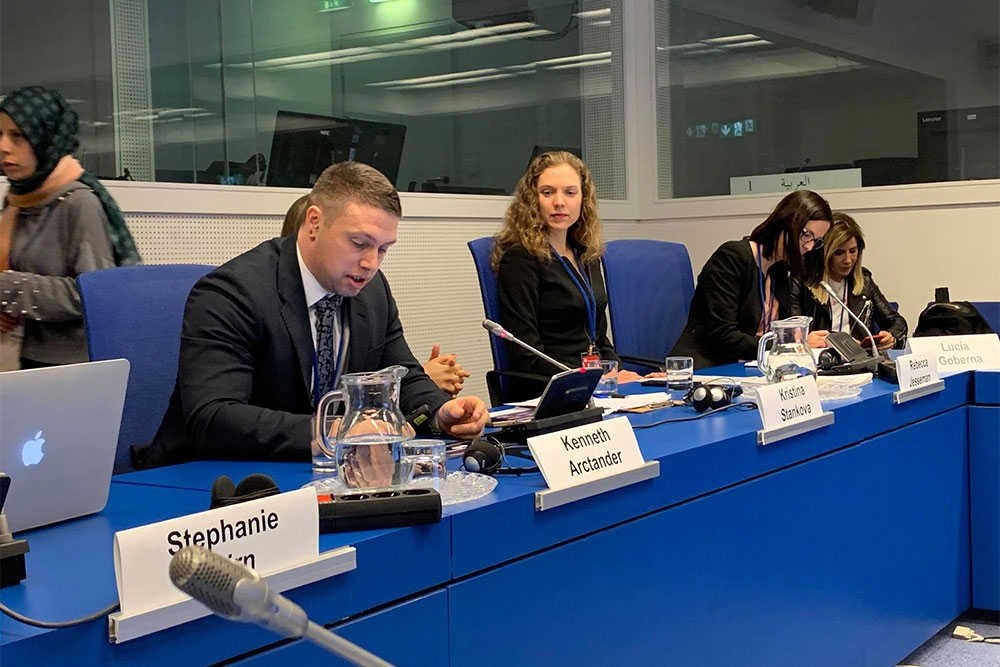RIO arrangerte et side event på den 63. narkotikakommisjonen ved FN-kontoret for narkotika, sammen med Dianova International, Canadiske myndigheter, The Canadian Centre on Substance Addiction, Proyecto Hombre ogTyrkiske Grønne Halvmåne. Daglig leder, Kenneth Arctander, tok i RIOs innlegg et kraftig oppgjør med en stigmatiserende mediedebatt i Norge. Han pekte på en fryktpreget debatt der flere aktører tar for lett på straff av rusbrukere, aviser som har grovt stigmatiserende forsider og bruker stigmatiserende uttrykk. Han pekte også på den opphetede debatten som oppstod i kjølvannet av kampanjen til Foreningen Tryggere Ruspolitikk i 2019. RIO er kjent med at denne kampanjen har ført til at politikere har involvert seg og at tilskuddet til Rusopplysningen.no er fjernet. Noe som i seg selv er alvorlig i og med at det er vanlig forvaltningskotyme at politikerne holder en armlengdes avstand til finansieringsordninger hos direktoratet.
Til slutt, oppfordret han samtlige med erfaringer med rus om å delta i debatten, og motbevise stereotypiske forestillinger om personer med rusutfordringer eller personer som bruker illegale rusmidler.
Se film av innlegget her, eller les hele innlegget her:
Ladies and gentlemen, colleagues and friends.
Thank you for coming to this side event on the media in the field of drugs.
Last year, I presented a statement on behalf of Dianova International on media and stigma -urging media to not make sensational and tabloid news articles and use stigmatizing language about people who use drugs.
Since then, in Norway, the Public Drug Policy Reform Committee where I was a member, have proposed a model for decriminalisation of possession and use of minor quantities of illegal drugs. This has contributed to a vital debate.
To get an overview, Dagny Adriaenssen Johannessen, a PhD-candidate at Oslo Metropolitan University, did a structured search in national and online newspapers between December 19th, and January 17th. In the rest of Norwegian media, articles from the two days with most coverage on decriminalisation were gone through.
We extracted information from 60 of the 169 coverages, and for simplicity causes, the cases were divided into pro’s and against’s of the proposition of the reform committee.
What we can say, is that almost everyone agrees that we shall no longer punish people with an established dependency. The debate becomes more problematic when addressing how society can control people that use drugs for recreational purposes and youth.
The argument against, is that decriminalisation, and especially a non-sanctions based model, will lead to increased drug use. People who have been given a mandatory meeting for an information and dissuasion conversation, will not show. Some worry that we sacrifice young people in order to help drug dependent older people.
The pro’s are pointing to lack of scientific evidence to claim that punishment reduces use of drugs, and that decriminalisation will lead to increased use. Also, advantages of punitive sanctions has to surpass disadvantages with a sufficient margin. Disadvantages being stigmatization, economic and human costs for society, with punitive sanctions meant to harm the person for transgressing the law.
Even though the debate is a development, I find the premise problematic and recall recent media debates about how Portuguese decriminalisation is advised since it had led to reduced overdose deaths.
First, it’s not true. Second, such premises become “we can decriminalise drug use if it does not lead to increased use and we can do it if these people stop dying”. In a polemic sense, I could say that it translates to “we will stop hurting you only if you don’t die from the pain”.
Is it not a better question to ask if it is justified for the state to intentionally harm people when they are not doing harm to others? And could we also say that the needed level of justification for imposing this harm, corresponds to the social position of the population in question? I believe so.
Even in Norway, where we are in the process of reform, people who use drugs are stigmatized.
Recently, a newspaper columnist in Norway, described drug dependent people as lowing, or mooing, (sacred) cows, armed to the teeth and defecating in public. His solution? An «effective sanitation policy». I criticized the newspaper for this, was censored, and the editor accused me of wanting to ‘cancel’ or ‘de-platform’ an important voice in the debate.
A few years ago, a newspaper published an article about a neighborhood that was protesting a municipal plan of establishing a housing unit for people with severe drug problems. The photo in the article shows a child holding a sign with the text «No drug misusers where I live».
And recently another local paper published a “feel-good story” about toddler parents who had prevailed in the fight against the municipality’s plan of establishing two homes for people with substance abuse problems in their neighborhood. The front cover was adorned by happy parents and children who had defeated the threat. When I contacted the journalist to say what I meant about the angle, I got the answer that I could read up on the statistics of drugs and crime.
The addict may not be portrayed as often as a threat anymore, but very often as a sick and helpless individual. Several times, I have experienced penning and op-ed only to have it illustrated with a dirty hand with open wounds, holding a syringe, with trash in the background. As if that hand has anything to do with me, just because I’ve been using drugs.
The caricatured drug addict is the notion many have about drug users, either as a threat or as someone to pity. And he is celebrated when he recovers from addiction and finds «the way out».
This is possible, I claim, due to how we talk about drugs. While mental health problems are increasingly normalized in the media, drug dependency and drug use is still not.
Stakeholders are concerned making sure that drug use is not socially accepted, to keep use low, and therefore have less health problems.
Yes, well, but you cannot have that as your issue of concern and at the same time claim that you oppose stigmatisation.
This contradiction between normalization and stigmatisation becomes apparent in some debates that surface. Recently, there was a campaign by a NGO called the association for safer drug policies, that works for harm reduction and, yes, liberalisation of policies in Norway.
Five posters in one metro station in Oslo claimed that people did not die from using for instance MDMA and some other substances since they managed their dosages and did not mix with other drugs – spurring a national debate with politicians and NGOs framing it as advertising drug use, normalising drugs, lowering the threshold for drug use, and that it could be deadly. One politician accused the association of attempted murder.
The campaign referred to a website that had information about risks, harms, side-effects and dosing of different drugs.
I have yet to meet anyone who says they want to stigmatize drug users. But is not the idea that drugs should not be be socially accepted, limiting the way we can talk about them? Either as illness, as a threat or as a success story where the person is free from use?
Isn’t this also why the drug user becomes reduced to a problem?
As a person who have had drug use problems, it pains me to see «my people» presented as threats to children or as animals that need to be washed away. And that those who advocate such discrimination are considered important voices while those who strive for destigmatization, or normalization, are attacked and accused of attempted murder.
The consequences of such discourses, I claim, is discrimination. Legalized discrimination, as has been the case for the last ten years where the police have issued double fines (1000 euro) in areas in Oslo and Bergen where we find for the most part marginalized populations of drug users.
And so, what do we do? My proposal is foolishly simple and obvious to everyone, we take part in the debate. First, of course, my government and our health minister is on the right track to decriminalize and remove punitive policies.
Then, in the wake of that, us that have used drugs, those that have had problems and those that have not had problems, and people that are currently using, people with a variety of different life stories, need to take part in the debate. As the famous Norwegian professor and founder of peace theory, Johan Galtung, have claimed. The best way to counter prejudices, is to prove them wrong. We are not animals, and we need not be washed away, we shall not be reduced to being problems or alienated, we can and we will contribute to society and we must state that, publically, in the media, at conferences, again and again, so that the people that come after us will not face the same discrimination that our generation has faced.

